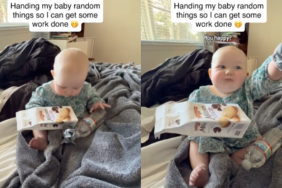
For about the first four months of life, babies think that when something is out of view, it’s gone for good. That blanket or pacifier that drops to the ground is gone forever. At around five months, however, babies learn that their favorite toys, people, and items still exist even when they’re out of sight. This is called object permanence.
Object permanence is a cognitive skill that develops shortly after object recognition, which is when babies can recognize a favorite teddy bear or book. Babies learn object recognition at about three months after they begin to recognize their parents or caregivers.
When does object permanence develop?
Object permanence typically develops between four and eight months of age. It’s always crucial to remember that all babies develop on their own timelines. Developmental milestones provide a guide for what to expect as your baby grows, but babies don’t follow a script.
Object permanence isn’t simply about understanding that objects still exist even when they’re out of view, it’s also a precursor to symbolic understanding (which contributes to language development) and it helps babies work through separation anxiety.
How can parents help babies understand object permanence?
Working on object permanence with babies can be a lot of fun. Try some of these games to help your little one understand that out of sight doesn’t mean gone forever:
• Hidden toys: Babies delight in finding their favorite toys hidden under a small towel or blanket. Show your baby his toy when you have his attention, place the towel on top, and encourage your baby to find the toy.
• Peek-a-boo: This favorite game of many babies gives them an opportunity to look at their favorite people while they play a pint-sized version of hide-and-seek.
• Talk from around the corner: Keep talking to your baby when you are out of view to help your baby understand that you are still nearby even if you’re not in his line of sight.
• Encourage curiosity: There’s no right way to play with a toy, and babies love to flip things over, shake them, and even explore them using their mouths. Resist the urge to teach your baby how to use a toy and let your baby figure it out independently. This helps your baby develop thinking skills.
• Narrate: Talking out loud as your baby plays helps your baby put words to actions as he explores objects. This also helps your make sense of the object in his hands.
Time spent playing with your baby is time helping your baby learn about the world around him. The more time your baby spends exploring his natural curiosity, the more your baby learns and grows.
image via Getty








